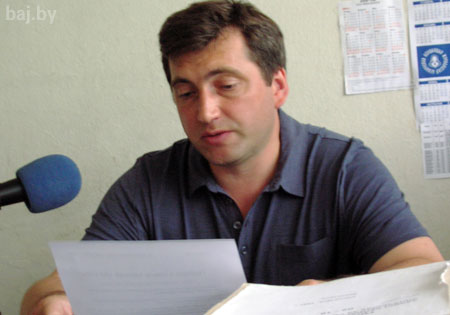It is a journalist‘s duty to report when human rights are being violated. And when state officials or riot police offend journalists human rights defenders stretch a helpful hand.
The simple understanding that quality work of one party is impossible without help of the other united journalists and human rights defenders who gathered last weekend in Vilnius.
Representatives of leading human rights organisations, Belrusian Association of Journalists (BAJ), experts and foreign guests participated in the event arranged by Norwegian Helsinki Committee and Human Rights House Foundation.
 According to Barys Zvozskau, president of Belarusian HRH, “often journalists and human rights defenders having more or less similar functions in the society act and work separately.
According to Barys Zvozskau, president of Belarusian HRH, “often journalists and human rights defenders having more or less similar functions in the society act and work separately.
Human rights defenders need better understanding of journalists’ values, the hierarchy of these values, what makes a good news event etc.”
Quick journalists and gradual HR defenders
Mr Zvozskau noted that oftentimes journalists do not have enough time to get to the bottom of the HR work. Mass-media needs the top news here and now. Whereas, HR defenders’ work takes years in some cases.
Nevertheless, there are situations when a quick HR defender comment or information about current civil rights violations could be of great importance to media.
 Andrei Bastunets, vice-chair of BAJ, noted: “I’ve talked with my colleagues, journalists, those who took part in this seminar. They now have a better understanding of what HR defenders actually do and the essence of problems, with which not only defenders but the whole of civil society is dealing.”
Andrei Bastunets, vice-chair of BAJ, noted: “I’ve talked with my colleagues, journalists, those who took part in this seminar. They now have a better understanding of what HR defenders actually do and the essence of problems, with which not only defenders but the whole of civil society is dealing.”
He stressed that journalists themselves should be interested in protection from persecution and HR defenders’ help. “The freedom of expression is not only one of the fundamental rights but also a criterion for implementation of other rights; often journalists are the ones who spread information about human rights violations.”
Human rights: a taboo in official mass media
One of the seminar participant shared that “apart from the quasi-thematic TV programme Human Rights, official state mass-media ignores HR as such in the country.” Mr Bastunets added that “position towards HR defenders is not just indifferent but often even scornful.”
During the seminar the tragic faith of an HR defender from Salihorsk (mining city in Central Belarus) Yana Paliakova was remembered several times. She committed suicide on the next day after the official weekly Sovieckaja Bełoruśsija/Soviet Belarussia belittled her in a slander like manner.
 Independent media of Belarus devote much more time to the HR problematic. However, they do not always do competently, participants said.
Independent media of Belarus devote much more time to the HR problematic. However, they do not always do competently, participants said.
Speaking about seminar outcomes Mr Bastunets said: “I hope that this kind of meeting would help to cover HR problems with more depth and expertise.”
***
The independent TV channel BelSAT presented several programmes dedicated to human rights and also introduced a discussion club of an HR documentary. Eduard Melnikau, channel’s talk show host, was invited as an expert.
Norwegian and Belarusian points of view on ethical journalism standards were compared.
Based on BAJ, HRHF and Legal Initiative practice cases of the freedom of expression violations and access to information in Belarus were studied to pay more attention to them in the future.
The European Court on Human Rights legal practice, which influences journalists and HR defenders who work with the freedom of expression violations, was also presented and discussed at the seminar.
Related links
Seminar for hviterussiske journalister og menneskerettighetsaktivister


